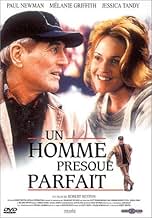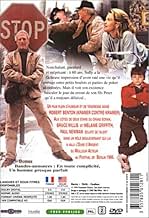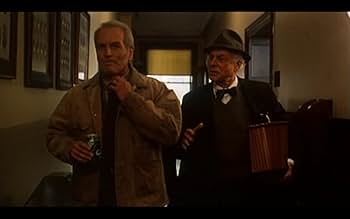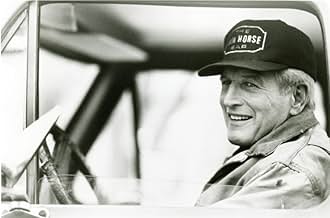Un uomo testardo, non più al suo apice, riflette sulla sua vita di assoluta indipendenza ed esige di più da se stesso.Un uomo testardo, non più al suo apice, riflette sulla sua vita di assoluta indipendenza ed esige di più da se stesso.Un uomo testardo, non più al suo apice, riflette sulla sua vita di assoluta indipendenza ed esige di più da se stesso.
- Candidato a 2 Oscar
- 5 vittorie e 10 candidature totali
Carl J. Matusovich
- Wacker
- (as Carl John Matusovich)
Recensioni in evidenza
I have a theory that everyone remains a teenager until they day they die. Not the teenagers of the "Porky" franchise or the airheads of "Clueless" necessarily, but the mature, emotionally headstrong old souls of "The Breakfast Club" and "Flirting". Some grown-up teenagers are more jaded, considerate, and successful than others, while the remaining irresponsible hooligans look like adults but, in a "Shallow Hal"-ish twist, are actually fifteen- year-olds still in search of an identity. Look at those middle-aged men and women with graying hair taking your order at Wendy's: are they not a regretful little girl or boy who doesn't quite realize they're trapped in an adult's body?
Sully (Paul Newman) belongs in the camp of the charismatic loners who never took the time to accept their responsibilities and actually grow up. He has freelanced in the construction industry his entire life, most recently making the most of his aging body by suing Carl Roebuck (Bruce Willis), the local contractor, to get extra pocket change. Years ago, Sully left his family at an important time, leaving his now grown son (Dylan Walsh) emotionally stunted, his ex-wife understandably jilted — why he did it is hard to explain. Commitment was never very attractive to him, and having a family hardly supplemented his lone wolf instincts. Part of his psyche is tarnished by guilt, but the other side reminds him, time and time again, that being a father, a husband, was never for him anyway.
Currently, Sully rooms with his former eighth grade teacher, the elderly Beryl Peoples (Jessica Tandy), and passes the time doing dirty work around town and flirting with Carl's long suffering wife (Melanie Griffith). This has been his routine for years, decades even. So when his son comes to town, his wife and kids in tow, Sully is forced, after years of ignoring his most personal problems, to decide whether or not he wants to make up for lost time and finally become the father his son deserved, or ignore the facts and continue living in his own form of sheltered reality.
Paul Newman, even when playing the bad guy (a rare case), has never done anything besides be likable. In "Cool Hand Luke", he was a should-have-been tarnished anti-hero; in "The Verdict", he was an alcoholic grouch who felt it necessary to punch Charlotte Rampling right in the kisser after she betrayed him. Fact is, even when portraying a man at his lowest point, Newman has always been the guy you want to be friends with, the guy who wish was your father, your uncle, your grandfather. There is something starkly humble, and believably all-around good, about him, on screen or off.
In "Nobody's Fool", he plays a hustler we should, in our good senses, despise. Every character trait that shapes Sully is negative; what good has he done in his life besides make friends with barflies and keep his former teacher company? But damn it all to hell: it's impossible not to root for anyone portrayed by Newman. The film finds him nearing seventy, on the last legs of his long career. But hardly aged is his ability to give a face for the everyman, and, yes, the man-children who weren't fantastic youths but, hesitant or not, want to make up for it. Does "Nobody's Fool" provide for one of Newman's greatest performances? It's hard to say: he doesn't have to stretch his abilities like he has had to in the past. What he does do, though, is remind us why he is the movie star Hollywood, I'm sorry to say, can hardly muster today.
Robert Benton, whose "The Late Show" has recently become a favorite of mine, writes and directs. A filmmaker who seems to specialize in the complexities of human relationships ("Kramer vs. Kramer", "Places of the Heart"), "Nobody's Fool" is masterful in its characterizations: near instantly, each character feels completely drawn, as if we have known them for years, as if we have heard all the town gossip that surrounds them. The knotty relationship between Sully and Toby Roebuck (Griffith) especially rings true — both are so fiercely independent that their flirting with one another comes less from a romantic place and more out of a desperate one. So unhappy are they that a mutual affection comforts their lonely ills. Romance, though? It requires too much commitment and dedication, and both have been too scorned by the past to do anything about their already shaky feelings.
The characters of "Nobody's Fool" are almost abominably flawed, but we find their scarred personas more soothing than bothersome. We feel like we know these people, as if we also live in North Bath and have nothing better to do besides confide in our neighbor. Benton and his actors bring a world of lonely hearts startlingly to life; as messed up as they are, we want to be lonely with them.
Sully (Paul Newman) belongs in the camp of the charismatic loners who never took the time to accept their responsibilities and actually grow up. He has freelanced in the construction industry his entire life, most recently making the most of his aging body by suing Carl Roebuck (Bruce Willis), the local contractor, to get extra pocket change. Years ago, Sully left his family at an important time, leaving his now grown son (Dylan Walsh) emotionally stunted, his ex-wife understandably jilted — why he did it is hard to explain. Commitment was never very attractive to him, and having a family hardly supplemented his lone wolf instincts. Part of his psyche is tarnished by guilt, but the other side reminds him, time and time again, that being a father, a husband, was never for him anyway.
Currently, Sully rooms with his former eighth grade teacher, the elderly Beryl Peoples (Jessica Tandy), and passes the time doing dirty work around town and flirting with Carl's long suffering wife (Melanie Griffith). This has been his routine for years, decades even. So when his son comes to town, his wife and kids in tow, Sully is forced, after years of ignoring his most personal problems, to decide whether or not he wants to make up for lost time and finally become the father his son deserved, or ignore the facts and continue living in his own form of sheltered reality.
Paul Newman, even when playing the bad guy (a rare case), has never done anything besides be likable. In "Cool Hand Luke", he was a should-have-been tarnished anti-hero; in "The Verdict", he was an alcoholic grouch who felt it necessary to punch Charlotte Rampling right in the kisser after she betrayed him. Fact is, even when portraying a man at his lowest point, Newman has always been the guy you want to be friends with, the guy who wish was your father, your uncle, your grandfather. There is something starkly humble, and believably all-around good, about him, on screen or off.
In "Nobody's Fool", he plays a hustler we should, in our good senses, despise. Every character trait that shapes Sully is negative; what good has he done in his life besides make friends with barflies and keep his former teacher company? But damn it all to hell: it's impossible not to root for anyone portrayed by Newman. The film finds him nearing seventy, on the last legs of his long career. But hardly aged is his ability to give a face for the everyman, and, yes, the man-children who weren't fantastic youths but, hesitant or not, want to make up for it. Does "Nobody's Fool" provide for one of Newman's greatest performances? It's hard to say: he doesn't have to stretch his abilities like he has had to in the past. What he does do, though, is remind us why he is the movie star Hollywood, I'm sorry to say, can hardly muster today.
Robert Benton, whose "The Late Show" has recently become a favorite of mine, writes and directs. A filmmaker who seems to specialize in the complexities of human relationships ("Kramer vs. Kramer", "Places of the Heart"), "Nobody's Fool" is masterful in its characterizations: near instantly, each character feels completely drawn, as if we have known them for years, as if we have heard all the town gossip that surrounds them. The knotty relationship between Sully and Toby Roebuck (Griffith) especially rings true — both are so fiercely independent that their flirting with one another comes less from a romantic place and more out of a desperate one. So unhappy are they that a mutual affection comforts their lonely ills. Romance, though? It requires too much commitment and dedication, and both have been too scorned by the past to do anything about their already shaky feelings.
The characters of "Nobody's Fool" are almost abominably flawed, but we find their scarred personas more soothing than bothersome. We feel like we know these people, as if we also live in North Bath and have nothing better to do besides confide in our neighbor. Benton and his actors bring a world of lonely hearts startlingly to life; as messed up as they are, we want to be lonely with them.
It's next to impossible not to like Paul Newman on screen, so it's a tremendous active achievement when he plays an unsympathetic character. Sully, his greatest role since "Hud," depicts Newman at his worst and thus at his best. Tom Hanks was remarkable in "Forrest Gump," but Newman deserved the 1994 Best Actor Oscar for "Nobody's Fool." The movie's greatness lies in the relationships between Newman and two other characters. Jessica Tandy is closer to Newman than her own son, played by Josef Sommer (who it's revealed is a white-collar crook and thus a bigger scoundrel than Sully, whom he despises). Likewise, Newman connects easier with co-worker Rub than with his own son, who can't see beyond his father's betrayal during a wayward youth. The reconciliation between Sully and Rub on a back porch may be the greatest of Newman's career ("Peter's my son. You're my best friend," Sully says in terms that even the slow-thinking Rub can grasp instantly). Robert Benton, who also directed the heartwarming "Places in the Heart," gives us an equally personal, but more disciplined work. He assembles A-list performers (Bruce Willis and Melanie Griffith are magnetic on screen), gives them marvelous dialogue ("You're a man among men," Griffith tells Newman twice in the movie but with different meanings) and melts our hearts. But acting honors go to Newman, whose complex Sully becomes if not loving, then at least a responsible, functioning, vital member of the human race. And, in the end, nobody's fool.
Newman uses a lifetime of acting experience to give a burnished, affecting portrayal of Sully, a dysfunctional father and husband who is basically well-intentioned but has never been able to connect with anyone or live up to his responsibilities. His family arrives back in town and he begins the long-delayed process of reconnecting with his son and grandsons.
Like "Mr. & Mrs. Bridge" of a few years back, this is a low-key, slice-of-life drama, a type of film that can be deadly dull in the wrong hands but which in this case, under director Robert Benton's guidance, and aided by a fabulous script and wonderful cast, is totally engrossing.
The script is spare and lean and all the more effective for that. It never goes for heavy emotional effects, but makes its points in a powerfully understated way. The many moments of humor stand out in high relief. Excellent acting all around (this was one of Jessica Tandy's last films; also in the cast are Bruce Willis, a better actor than he is generally given credit for, and Melanie Griffith). The feeling of life in a down-at-the-heels northeast U.S. town in midwinter is superbly brought across; the movie has a real 'lived-in' atmosphere.
A definite A+.
Like "Mr. & Mrs. Bridge" of a few years back, this is a low-key, slice-of-life drama, a type of film that can be deadly dull in the wrong hands but which in this case, under director Robert Benton's guidance, and aided by a fabulous script and wonderful cast, is totally engrossing.
The script is spare and lean and all the more effective for that. It never goes for heavy emotional effects, but makes its points in a powerfully understated way. The many moments of humor stand out in high relief. Excellent acting all around (this was one of Jessica Tandy's last films; also in the cast are Bruce Willis, a better actor than he is generally given credit for, and Melanie Griffith). The feeling of life in a down-at-the-heels northeast U.S. town in midwinter is superbly brought across; the movie has a real 'lived-in' atmosphere.
A definite A+.
7uhu
Newman is acting just perfectly in this small town movie in his role as a 60 years old man who has not achieved much in his life, but begins to realize this when his son, whom he hasn't seen since he left his family, shows up with his kids, Newman's grandsons. The complicated (or maybe not so complicated) married life of Willis and Griffith add to the plot. Some quite witty scenes and lines make you laugh heartily, although the film's general tone is more on the serious side.
What a gem! Apparently this film did have a theatrical run, but I had never heard of it until I saw it on cable a few years ago. Paul Newman was, as always, masterful. So was Jessica Tandy. As unlikeable as Bruce Willis is, he is a great actor and does very well here. And even though it was a fairly small part, I think this is Melanie Griffith's best work ever. The script, directing, everything came together seamlessly. I highly rcommend this film. Grade: A
Lo sapevi?
- QuizBruce Willis reportedly agreed to a substantial pay cut to appear in the film, accepting the SAG-AFTRA scale of $1,400 per week at a time when the actor was earning roughly $15 million for his action movies.
- BlooperWhen Sully and Peter are stealing the snowblower from the Tip Top construction yard, Peter has to climb the fence to get in. Once in, Sully throws him a bolt cutter to cut the chain holding the snowblower. Why didn't they just use the bolt cutter to get in instead of climbing the fence? And if that wasn't possible, how did they get the snowblower out?
- Citazioni
Carl Roebuck: Sixty years old and still getting crushes on other men's wives. I would hope by the time I'm your age, I'm a little smarter than that.
Sully: Can't hurt to hope. You sure are off to a slow start.
- Curiosità sui creditiBouquets by Christine... florist for Hattie's funeral at St.Luke's cemetery in Beacon, NY
- Colonne sonoreCall Me Irresponsible
Written by Sammy Cahn and Jimmy Van Heusen
Performed by Patti Page
Courtesy of Columbia Records
By Arrangement with Sony Music Licensing
I più visti
Accedi per valutare e creare un elenco di titoli salvati per ottenere consigli personalizzati
Dettagli
Botteghino
- Budget
- 20.000.000 USD (previsto)
- Lordo Stati Uniti e Canada
- 39.491.975 USD
- Fine settimana di apertura Stati Uniti e Canada
- 92.838 USD
- 26 dic 1994
- Lordo in tutto il mondo
- 39.491.975 USD
- Tempo di esecuzione1 ora 50 minuti
- Colore
- Mix di suoni
- Proporzioni
- 1.85 : 1
Contribuisci a questa pagina
Suggerisci una modifica o aggiungi i contenuti mancanti

Divario superiore
By what name was La vita a modo mio (1994) officially released in India in Hindi?
Rispondi





































